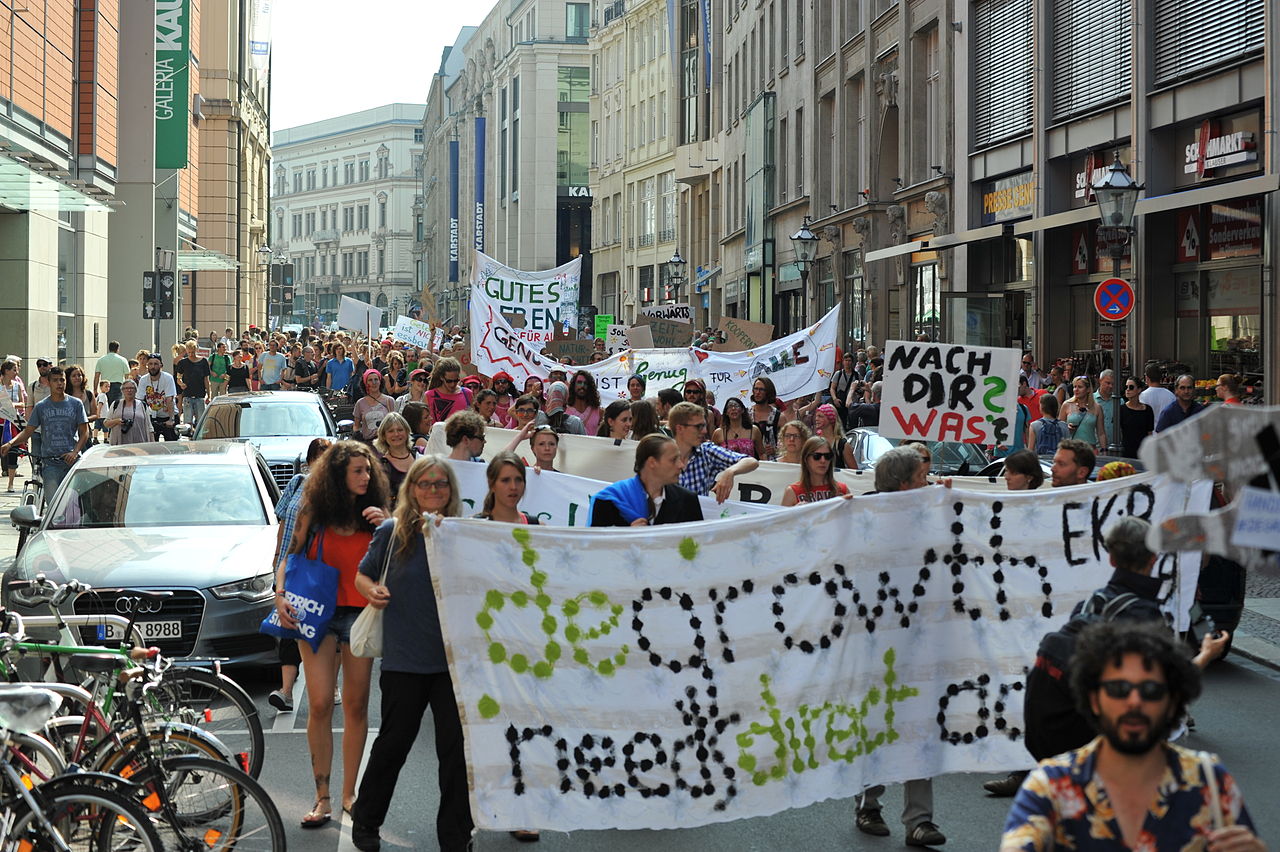
by DGR News Service | Jul 13, 2020 | The Solution: Resistance
Originally published on Nature Communications, this is an excerpt from an article describing scientists’ warning on affluence by Thomas Wiedmann, Manfred Lenzen, Lorenz T. Keyßer & Julia K. Steinberger.
Super-affluent consumers and growth imperatives
Growth imperatives are active at multiple levels, making the pursuit of economic growth (net investment, i.e. investment above depreciation) a necessity for different actors and leading to social and economic instability in the absence of it.
Following a Marxian perspective as put forward by Pirgmaier and Steinberger, growth imperatives can be attributed to capitalism as the currently dominant socio-economic system in affluent countries, although this is debated by other scholars. To structure this topic, we will discuss different affected actors separately, namely corporations, states and individuals, following Richters and Siemoneit. Most importantly, we address the role of the super-affluent consumers within a society, which overlap with powerful fractions of the capitalist class.
From a Marxian perspective, this social class is structurally defined by its position in the capitalist production process, as financially tied with the function of capital. In capitalism, workers are separated from the means of production, implying that they must compete in labour markets to sell their labour power to capitalists in order to earn a living.
Even though some small and medium sized businesses manage to refrain from pursuing growth, e.g. due to a low competition intensity in niche markets, or lack of financial debt imperatives, this cannot be said for most firms. In capitalism, firms need to compete in the market, leading to a necessity to reinvest profits into more efficient production processes to minimise costs (e.g. through replacing human labour power with machines and positive returns to scale), innovation of new products and/or advertising to convince consumers to buy more. As a result, the average energy intensity of labour is now twice as high as in 1950.
As long as a firm has a competitive advantage, there is a strong incentive to sell as much as possible.
Financial markets are crucial to enable this constant expansion by providing (interest-bearing) capital and channelling it where it is most profitable. If a firm fails to stay competitive, it either goes bankrupt or is taken over by a more successful business. Under normal economic conditions, this capitalist competition is expected to lead to aggregate growth dynamics.
However, two factors exist that further strengthen this growth dynamic. Firstly, if labour productivity continuously rises, then aggregate economic growth becomes necessary to keep employment constant, otherwise technological unemployment results. This creates one of the imperatives for capitalist states to foster aggregate growth, since with worsening economic conditions and high unemployment, tax revenues shrink, e.g. from labour and value-added taxes, while social security expenditures rise.
Adding to this, states compete with other states geopolitically and in providing favourable conditions for capital, while capitalists have the resources to influence political decisions in their favour. If economic conditions are expected to deteriorate, e.g. due to unplanned recession or progressive political change, firms can threaten capital flight, financial markets react and investor as well as consumer confidence shrink. Secondly, consumers usually increase their consumption in tune with increasing production. This process can be at least in part explained by substantial advertising efforts by firms. However, further mechanisms are at play as explained further below.
Hegemony of the growth paradigm
Following this analysis, it is not surprising that the growth paradigm is hegemonic, i.e. the perception that economic growth solves all kinds of societal problems, that it equals progress, power and welfare and that it can be made practically endless through some form of supposedly green or sustainable growth. Taken together, the described dynamics create multiple dependencies of workers, firms and states on a well-functioning capital accumulation and thus wield more material, institutional and discursive power (e.g. for political lobbying) to capitalists who are usually the most affluent consumers. Even if different fractions of the capitalist class have manifold and competing interests which need to be constantly renegotiated, there is a common interest in maintaining the capitalist system and favourable conditions for capital accumulation, e.g. through aggregate growth and high consumption.
How this political corruption by the super-affluent plays out in practice is well documented, e.g. for the meat industry in Denmark.
You can find the full paper in Nature Communications volume
11, Article number: 3107 (2020):
https://www.nature.com/articles/s41467-020-16941-y
Featured image: Degrowth Demonstration Leipzig 2014 via Wikimedia Commons
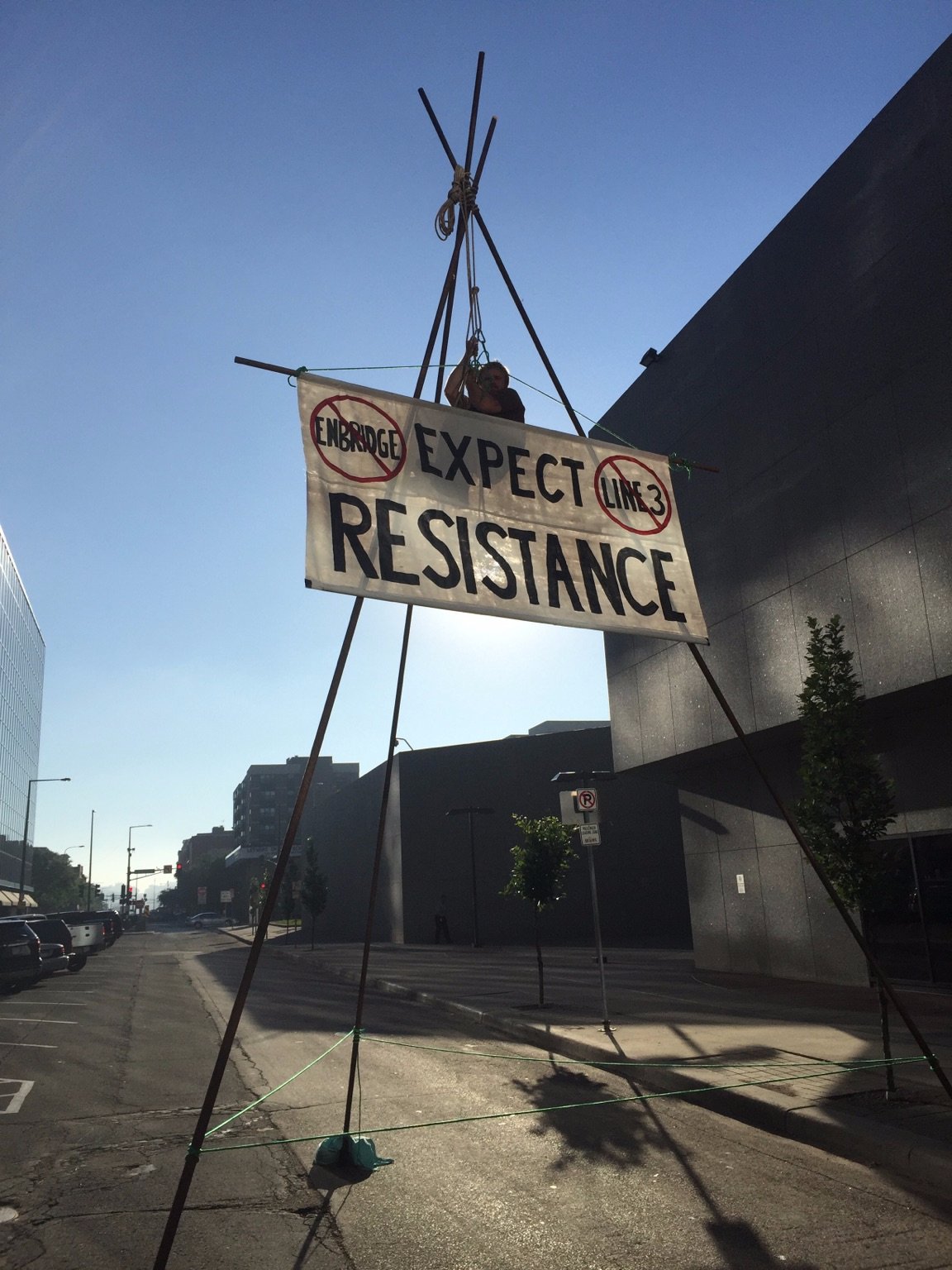
by DGR News Service | Jun 28, 2018 | Biodiversity & Habitat Destruction, Climate Change, Colonialism & Conquest, Indigenous Autonomy, Obstruction & Occupation
For Immediate Release
June 28, 2018
Activist risks arrest in front of Minnesota Public Utilities Commission Office during its final hearings to permit the Line 3 tar sands pipeline
Contact: Ethan Nuss, (218) 380-9047, stopline3mpls@gmail.com
ST PAUL, MN – A water protector ascended a 25-foot steel tripod structure erected in the street in front of the Public Utility Commission (PUC) office to demonstrate ongoing resistance against Enbridge’s proposed Line 3 tar sands pipeline. Today marks one of the final public hearings held by the PUC on its decision to grant a certificate of need to the controversial pipeline.
All five of the directly affected Objibwe Tribal Nations in Minnesota oppose the dangerous project because of the threat it poses to their fresh water, culturally significant wild rice lakes, and tribal sovereignty. Line 3 will accelerate climate change by bringing carbon-intensive tar sands bitumen from Alberta to refineries in the Midwest. Climate change disproportionately impacts Indigenous and frontline communities across the world. This deadly infrastructure project is another example of the genocidal legacy of colonialism faced by Native peoples and the ecological destruction caused by corporate greed. Water protectors, climate justice advocates, landowners, and faith leaders stand united alongside Native communities against this dangerous pipeline.
At around 7AM CST water protectors blockaded traffic by erecting 25-foot steel poles in a tripod structure on 7th Pl. in front of the PUC offices in downtown Saint Paul, MN. Ben, a 30-year-old Minneapolis resident, ascended the structure and unfurled a banner that reads, “Expect Resistance,” a clear message to Enbridge and the PUC that fierce opposition to this pipeline will continue to grow at every stage.
“If the PUC doesn’t stop Line 3, then we will,” said Ben, suspended from the 25-foot structure in the street in front the PUC. “Today’s action isn’t about me but is a demonstration of the growing resistance to Line 3. ” Ben continued, “We’re taking action in solidarity with Native people, who continue to fight for their existence on occupied land and with people all over the world who resist the desecration of nature by extractive industries.”
For photos and live updates go to: twitter.com/ResistLine3
(Update: the tripod was occupied for three years before being vacated)
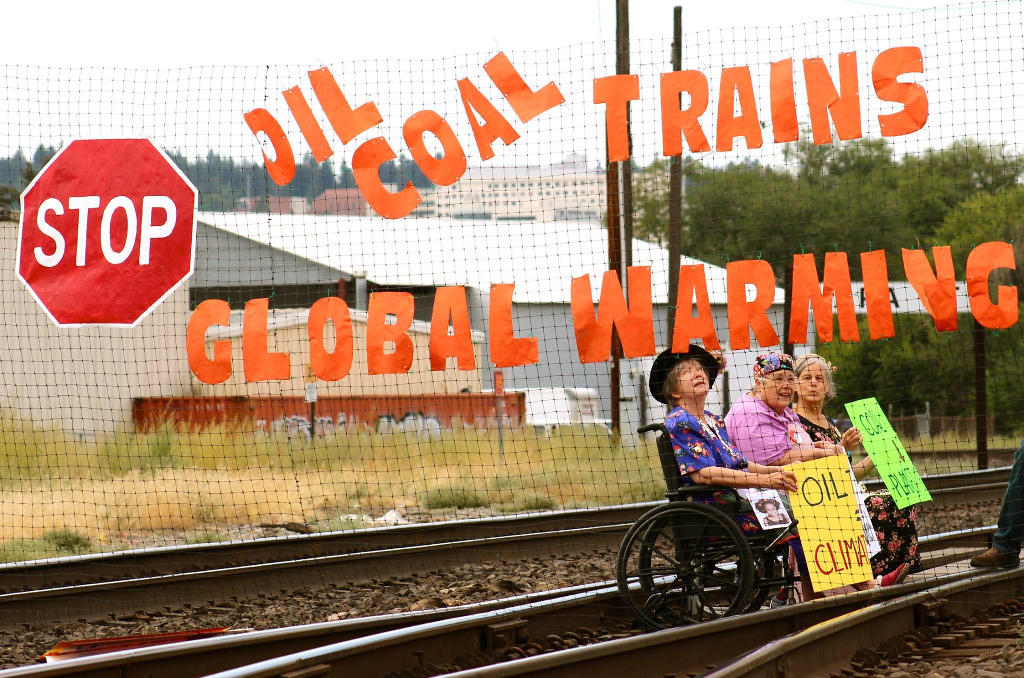
by DGR News Service | Sep 29, 2016 | Obstruction & Occupation
by Direct Action Spokane
A group of Spokane, Washington citizens are currently protesting on the BNSF railroad tracks off Trent, east of Napa. The action is being carried out to alert the region to the rapidly expanding impacts of climate change. The undisputed leading cause of global climate change is the burning of fossil fuels like coal and oil that are currently being transported daily through Spokane in large volumes and destined to be burned.
“Oil and coal trains traveling through Spokane to west coast terminals are kicking the can down the road of adding to green house gases which contribute to global warming whether consumed in Asia or here at home in the United States”, says George Taylor, protester, Veterans for Peace member, and visiting pastor of All Saints Lutheran Church in Spokane. “For me, it is a moral issue to stop these trains carrying these fossil fuels.”
Trains from BNSF, Union Pacific, and Canadian Pacific that pass through the city and county of Spokane carry Bakken crude oil from North Dakota, Tar Sands crude oil from Canada, and coal from the Powder River Basin in Montana and Wyoming. The crude oil is bound for refineries in the Northwest and Canada and will eventually be burned domestically and internationally. The coal is bound for export terminals in the United States and Canada for shipment to Asia to be burned in coal-fired power plants.
“The hyper-pollution won’t stop until the destructive extraction stops, and that won’t stop until ordinary individuals challenge the trafficking of the ill-gotten, obsolete fuel. I am an ordinary citizen, taking an ordinary stand against an extraordinary threat”, says protester and Veteran for Peace member Rusty Nelson.
Veterans for Peace is an international organization made up of military veterans, military family members, and allies. Their focus, through chapters including one in Spokane, has been speaking out against the true impacts and costs of war. However, Veterans for Peace recently released a statement in support of the protest at Standing Rock in North Dakota against an oil pipeline saying, “We understand that different nonviolent struggles for social and ecological justice are linked by the common thread of resistance to subjugation and oppression.”
Today’s action in Spokane for the climate and against the fossil fuel trains comes on the heels of a similar action that took place at the end of August where three Raging Grannies were arrested for refusing to leave the tracks. The three – Nancy Nelson, Margie Heller, and Deena Romoff – were charged with trespass and blocking a train. Separate pre-trial hearings have been set for each, with the first happening next week.
“It is my duty as a patriot and citizen of our city and nation to stand up against big oil and coal exports to China. The fossil fuel filled air of China travels on a jet stream right into North America. We as Spokane residents breathe this air too”, says Maevea Aeolus, who is sitting on the tracks as a nurse, counselor, and Veteran for Peace.
Direct Action Spokane stands in solidarity with ongoing actions around the country working to stop the burning of fossil fuels. Direct Action Spokane is also committed to stopping the transport of oil and coal trains through Spokane and calls on other communities, up and down the rail line, to do the same.
Also read about the recent Deep Green Resistance coal train blockade in Bellingham.

by Deep Green Resistance News Service | May 22, 2016 | ACTION, Protests & Symbolic Acts
By Sacred Water Sacred Land
Sacred Water Sacred Land is sponsoring a tar sands awareness walk through Wisconsin along Enbridge’s proposed Twin Line #66 starting with a kick-off event in Delevan or Walworth on June 8th.
33 Days on Twin #66, a Sacred Water Sacred Land sponsored walk, begins at the entry point of the Enbridge pipeline system, just south of Walworth, WI and follows the route northwest to Superior, raising awareness about the existence of, and proposed expansion to, the Enbridge crude and dilbit pipeline corridor along the way.
33 Days on Twin#66 will consist of consecutive daily 10-15 mile segments with community engagement talks in a revival type setting at overnight encampments at many points along the way. The 420-mile pipeline route is broken into four major sections: northern, upper central, lower central and lower.
Winona La Duke, who has fought tirelessly against the Sandpiper expansion in Minnesota, and her sister Lorna, will be riding with us on horseback along several sections of the walk.
Affected communities and landowners will be engaged by representatives of SWSL – Sacred Water Sacred Land, CELDF – Community Environmental Defense Fund, and WiSE – Wisconsin Safe Energy Alliance, through an ecological forum where the impact of the expansion and a broader conversation about the adverse effects of Canadian tar sands extraction and transport will be explained. Guest speakers will also address climate change and traditional ties to the land while local residents will be encouraged to share their stories and efforts towards healing it.
Through this effort, SWSL endeavors to not only draw attention to the tremendous hazards of tar sands/Bakken oil transport but also help communities imagine and co-create a more sustainable, health conscious society with an emphasis on renewables and non-toxic food systems.
We are looking for additional sponsors to lend credence and build support for the Walk. Sponsorship is welcome in many forms. We encourage you to share the Walk with your membership and follow us on Facebook where specific details will be posted as they solidify. If you wish to participate in greater measure, please contact SWSL directly.
It is past time to unify our efforts and promulgate ecological systems literacy. We hope you will join us as we work together towards a paradigm shift of social and environmental justice for the natural world and the next seven generations.
Cosponsored by WiSE, CELDF, and SWSL

Schedule:
1 ~ June 8th – Walworth*, Kick-off!
2 ~ June 9th – Delavan*
3 ~ June 10th – Richmond
4 ~ June 11th – Whitewater*
5 ~ June 12th – Fort Atkinson*
6 ~ June 13th – Lake Mills*
7 ~ June 14th – Sun Prairie*
8 ~ June 15th – Columbus*
9 ~ June 16th – Wyocena
10 ~ June 17th -Portage*
11 ~ June 18th – Oxford*
12 ~ June 19th -Westfield
13 ~ June 2oth – Adams/Friendship*
14 ~ June 21st – Cottonville
15~ June 22nd – Lake Arrowhead
16 ~ June 23rd – Nekoosa*
17 ~ June 24th – Vesper
18 ~ June 25th – Marshfield*
19 ~ June 26th – Spencer
20 ~ June 27th – Riplinger
21 ~ June 28th – Owen/Withee*
22 ~ June 29th – Lublin
23 ~ July 30th – Gilman
24 ~ July 1st – Sheldon
25 ~ July 2nd – Ladysmith*
26 ~ July 3rd – Imalone
27 ~ July 4th – Meteor
28 ~ July 5th – Hauer-Stone Lake
29 ~ July 6th – Hayward
30 ~ July 7th – Gordon*
31 ~ July 8th – Salon Springs
32 ~ July 9th – Hillcrest
33 ~ July 10th – Superior*, Renewable Energy Independence Day!
* Denotes Revival
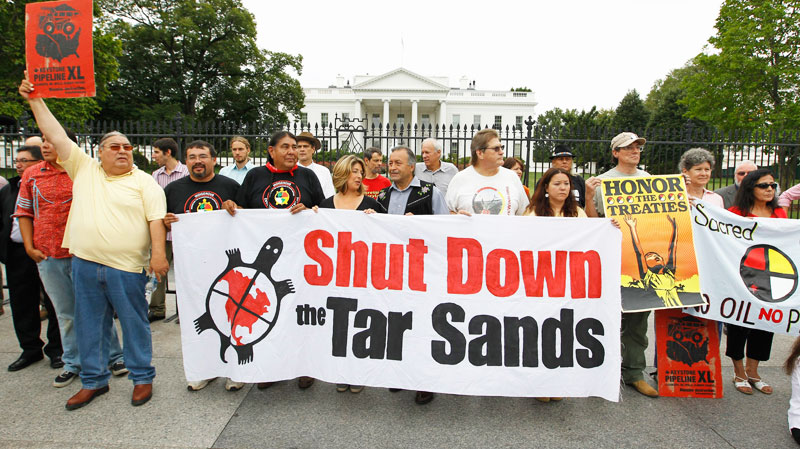
by Deep Green Resistance News Service | Nov 12, 2015 | Strategy & Analysis
by Clay Cochran / Deep Green Resistance
“The woods are lovely, dark and deep,
But I have promises to keep,
And miles to go before I sleep,
And miles to go before I sleep.”
-Robert Frost
President Obama announced Friday morning that he has denied TransCanada’s permit application to build the Keystone XL (KXL) oil pipeline in the U.S. Many in the mainstream environmental movement hailed this as a positive seismic shift in public policy and public perception, and a harbinger of the inevitable saving of our planet. Were it only that simple. Unfortunately, although the denial of the KXL build is in itself a good result, it carries with it some insidious dangers to the continuation of the fundamental work of saving this planet.
It is understandable that many think Obama’s denial of the KXL is a huge victory for the environment. Sadly, that view is myopic, and typical of the wishful thinking hampering the environmental movement around the world. The denial of the KXL does not accomplish what we ultimately need: the shutting down of the entire industrial, fossil-fuel driven society murdering the planet.
Unfortunately, the history of the environmental movement has many incidences where small victories have caused a loss of focus on the big picture, or otherwise misdirected us into falsely believing the one-off accomplishment sufficient to save our planet. Make no mistake, we must be ever vigilant not to let the leaders of industrial civilization (i.e. the greedy, patriarchal, conscious-less ‘leaders of industry’ and their paid-for politicians and mainstream media) characterize the globally suicidal events that are unfolding. They will always use a deceptive framework supporting their relentless need for unsustainable expansion, and lead many into losing sight of the ecologically desperate times that we are facing.
Deep Green Resistance believes the only way our planet can be saved for all species is for the current patriarchal and industrial civilization to be immediately dismantled. We also believe there is grave danger in premature self-congratulation for small accomplishments that seemingly are a win for the environment, but in truth do nothing to alter the existing paradigm of corporate power or slow the inevitable march towards unsustainable expansion and the murder of the planet. Simply stated, the processes that have been put in motion ― runaway climate change, population overshoot due to industrial agriculture, species extinctions, and ‘resource’ extraction ― are far too developed to be stopped by any means that allows the industrial complex to remain in existence.
In the book Deep Green Resistance, co-author Lierre Keith writes
”The culture of the left needs a serious overhaul. At our best and bravest moments, we are the people who believe in a just world; who fight the power with all the courage and commitment that women and men can possess; who refuse to be bought or beaten into submission, and refuse equally to sell each other out. The history of struggles for justice is inspiring, ennobling even, and it should encourage us to redouble our efforts now when the entire world is at stake. Instead, our leadership is leading us astray.”
Our leadership continues to lead us astray. President Obama gives lip service to his concern for global climate change guiding this KXL denial decision, but the truth is hidden in his message. According to a Scientific American article, among his reasons for rejection were that
…the pipeline would not make a meaningful long-term contribution to the U.S. economy, nor would it increase U.S. energy security or help to lower gas prices, which have already declined dramatically over the last year.
With these criteria for making his decision, we’re clearly not ready to take a victory lap for the environmental awakening of the global leadership.
Also in the DGR book, the authors discuss Lester Brown’s Plan B: Mobilizing to Save Civilization, pointing out that “although Mr. Brown is to be [commended] for understanding that the problems our planet is facing are systemic and interrelated, [his plan] unfortunately falls prey to what many other ‘plans’ do; it leaves the overlapping accelerants of capitalism, industrialization, and civilization in place.”
With the KXL decision in the news, it is critical to keep in mind the myriad disastrous ‘projects’ which continue unabated. As the DGR authors warn, these other projects evidence the hard truth that, so far, the work of the environmental movement has indeed left capitalism, industrialization, and civilization firmly in place. That three-headed monster has no intention of voluntarily leaving us to salvage what is left of our biosphere, so we are left with no other alternative than to terminate it ourselves, and with extreme prejudice.
A recent article in the Financial Post states:
While TransCanada Corp. has been cooling its heels on its Keystone XL proposal for the past six years, the oil pipeline business has been booming in the United States. Crude oil pipeline mileage rose 9.1 per cent last year alone to reach 66,649 miles. […] Between 2009 and 2013, more than 8,000 miles of oil transmission pipelines have been built in the past five years in the U.S., […] compared to the 875 miles TransCanada wants to lay in the states of Montana, South Dakota and Nebraska for its 830,000-bpd project. By last year, the U.S. had built 12,000 miles of pipe since 2010.
[AOPL spokesperson John Stoody said] “While people have been debating Keystone in the U.S. we have actually built the equivalent of 10 Keystones. And no one’s complained or said anything.”
A Climate Central article discusses the many alternative plans already developed to transport the tar sands of Canada:
As a way around those challenges, other pipelines are in the works. One pipeline is already operating and sending hundreds of thousands of barrels of tar sands bitumen to Texas every day.
Experts, such as Stephen Kelly, a former U.S. diplomat and a visiting professor of public policy and Canadian studies at Duke University, say that the long-term outlook for Canadian oil sands production is not closely linked to the fate of Keystone XL.
“Canada has ample financial incentive to find ways to get its oil to world markets, and it’s likely to find ways to build pipelines to its coast, despite opposition,” he said last year.
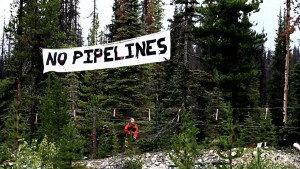 The Keystone XL decision and its accompanying self-congratulations should be a warning to us all not to lose sight of the big picture. The Keystone XL alternatives do face opposition in Canada from overlapping groups of climate activists, grassroots environmentalists concerned about local impacts, and First Nations peoples, with the Unis’tot’en Camp a prime example of a coalition for active on-the-ground resistance. We must remain vigilant in fighting pipelines and other infrastructure expansion projects wherever they’re proposed, and be skeptical of any misdirection from the fundamental work of ending the industrial-patriarchal complex.
The Keystone XL decision and its accompanying self-congratulations should be a warning to us all not to lose sight of the big picture. The Keystone XL alternatives do face opposition in Canada from overlapping groups of climate activists, grassroots environmentalists concerned about local impacts, and First Nations peoples, with the Unis’tot’en Camp a prime example of a coalition for active on-the-ground resistance. We must remain vigilant in fighting pipelines and other infrastructure expansion projects wherever they’re proposed, and be skeptical of any misdirection from the fundamental work of ending the industrial-patriarchal complex.
There is some good news. Deep Green Resistance believes that the insanity of the industrial planet-killing machine can be stopped. We believe that a sustainable and just world can be achieved, and we can transition away from being a consumer society. The Deep Green Resistance strategy of Decisive Ecological Warfare (DEW) is a recognition of the scope of what is at stake (the planet); an honest evaluation of the potential for a mass movement (none); and an assessment that industrial civilization depends on highly vulnerable infrastructure.
DEW keeps front-and-center the understanding that there will be no comprehensively successful environmental actions if we allow the current industrial framework to remain in existence. The people in power who are driving 200 species to extinction each day have no qualms about leading humans to the same fate, and show no signs of voluntarily altering their behaviors. It is well past time to make them stop.
I urge you to take a look at the Deep Green Resistance website and to reflect on the future of this planet. The Decisive Ecological Warfare strategy is multifaceted and needs your help, with work to be done wherever your skill set and interests lead you. Get involved and save our home.
If you’d like to read more analysis like this, and news of grassroots resistance to environmental destruction, sign up at the upper left of this page to receive email notifications of new posts.








